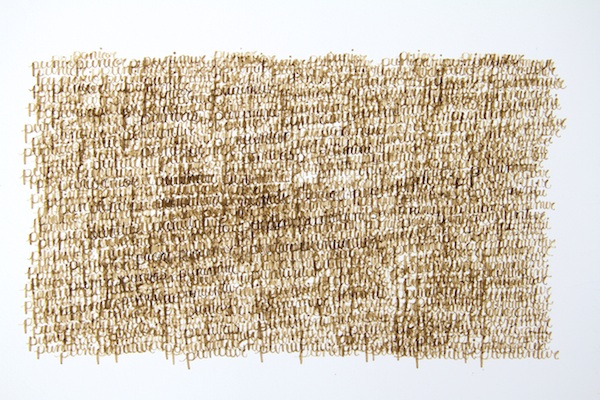【2003 Archives】
Punio003 Archives Punire
Arts & Culture

The New York City Marathon has come again, awing, baffling, and intimidating the more sedentary among us with its pursuit of voluntary physical punishment. In a downtown studio a few months ago, another marathon of sorts took place. Ruth Irving was filmed for three hours by the artist Jan Baracz writing the passive present conjugation of the Latin verb “to punish” (punio, punire). I am punished, you are punished … The camera was positioned over Irving’s shoulder as she dipped her calligraphy pen in the inkwell, tracing the words over and over until the page was covered. They had agreed she would just keep writing, creating layers of script on script. Jan looked nervously on, asking her occasionally in his absurdly thick Polish accent if she was okay, which she found irritating after awhile. Her own forced awareness—she couldn’t look away or she would lose her place on the page—was exhausting enough. She had imagined that the difficulty would be at least partly physical—hand cramps or parched throat. But the worst part of it was that she couldn’t stop, sit back and look. As an illustrator, calligrapher, and former architecture student, that’s what she did instinctively, or compulsively. The surveying pause of the artist before the brush lands on the paper. But she was working blind. That was true punishment.
Last fall, Ruth met Jan at a potluck thanksgiving in Brooklyn. They had an immediate, inexplicable rapport in the way only true odd couples can. Five foot ten, pale with raven-black hair, Ruth is from Melbourne, Florida, the daughter of conservative Christians. One of five children, she was homeschooled, wore long skirts, and was not allowed to listen to “music with rhythms.” She describes the environment as “a radical, defy-the-man mixture of religion and hippy anarchism.” She was pulled out of first grade just as she was just learning cursive. “I only knew half the cursive alphabet. It was something I was kind of embarrassed about.” As a result, two years ago, at age twenty-nine, she decided to teach herself to script. “Being homeschooled and being separated, it’s easy to cherish and hold on to, but at the same time it’s really painful,” she says. “Reality is so different from that precious bubble. I wanted to work on communicating with people. Now I’m scripting like everyone who went to school.” She became so adept at it that she was able to find work writing invitations and addressing formal envelopes.
Jan, who is fifty-five, grew up in communist Poland, the only child of an artist and a graphic designer. “I came from an insane mix of two repressive cultures, Catholicism and communism. My family was neither religious nor communist but the culture was soaked with it, that mentality of discipline and punishment. It’s still in my system.” A philosophy major, he moved to New York in 1981 and joined the movement of conceptual artists who were jacks of all trades—sculptors, builders, painters, electricians, videographers, mechanics. His work is minimalist and cerebral, labor intensive with a kind of exquisite simplicity as its result. “I loved Ruth’s scripting work, but I also had mixed feelings because it seemed so crafty and laborious,” he recalls. “To be perfecting handwriting is a ridiculously obsolete skill. It seems like a punishment in itself. So I thought, let’s push it farther. Let’s have a punishment assignment. I wanted to create this feeling of a classroom exercise, of something that you were supposed to write on a blackboard forever.”
As is clear from the contagiously grinning humanity in silver capes at the end of the marathon, one paradoxical consequence of punishing yourself is exhilaration. So it was with this “endurance performance piece.” The idea of transforming pain, which Jan likes to call our “default position,” into something else, is, after all, an ancient religious notion. “It’s like alchemy,” he says, a grin spreading on his handsomely dour Slavic features. “You have lead. It’s heavy. It’s not what you want in your life. Through misuse, you come up with a completely different quality. The result was so surprising.” So much so that Ruth took out her quill and did it again. This time for four hours.
Susannah Hunnewell is the Paris editor of The Paris Review.
Search
Categories
Latest Posts
FreeSync 2 Explained
2025-06-26 22:48Best headphones deal: Save $100 on the Beats Solo 4
2025-06-26 21:42Best Samsung Galaxy Watch Ultra deal: Save $200 at Best Buy
2025-06-26 21:24How to Easily Make iPhone Ringtones Using Only iTunes
2025-06-26 21:02Popular Posts
Commissioning Misleading Core i9
2025-06-26 22:25NASA scientists want to solve a mystery: Why did life "turn left?"
2025-06-26 20:24Best AirPods deal: Save $80 on Apple AirPods Pro 2
2025-06-26 20:08Featured Posts
Trump's new tariff plan spares some smartphones, laptops
2025-06-26 22:16Best LG C4 OLED TV deal: Save $300 on the 65
2025-06-26 21:57EPA's leader is open to reconsidering crucial climate assessment
2025-06-26 20:37Popular Articles
'Ask an Axolotl' is TikTok's sweet, comforting viral ditty
2025-06-26 21:55Wombat butt biting sex habits could be helpful for its survival
2025-06-26 21:07Newsletter
Subscribe to our newsletter for the latest updates.
Comments (1965)
Belief Information Network
Google will repair Hurricane Harvey victims' Pixel phones for free in Houston
2025-06-26 22:49Fast Information Network
Best AirPods deal: Save $80 on Apple AirPods Pro 2
2025-06-26 22:16Neon Information Network
Miami Heat vs. San Antonio Spurs 2025 livestream: Watch NBA online
2025-06-26 21:20Fashion Information Network
Private spacecraft gets dramatic view of Earth eclipsing moon
2025-06-26 21:09Pursuit Information Network
Apple is reportedly still working on smart glasses of some kind
2025-06-26 20:39